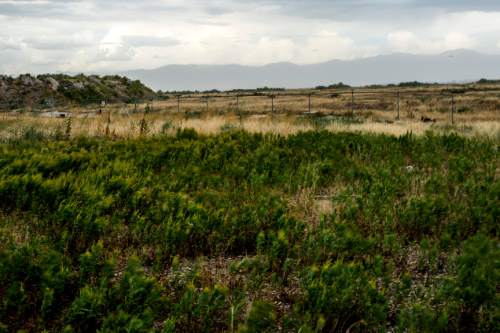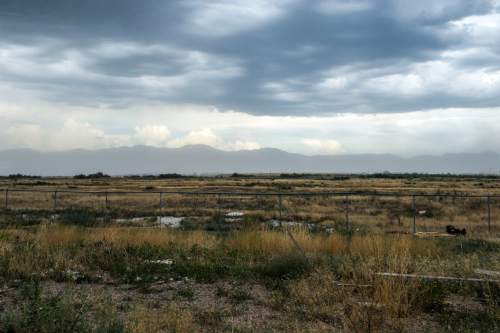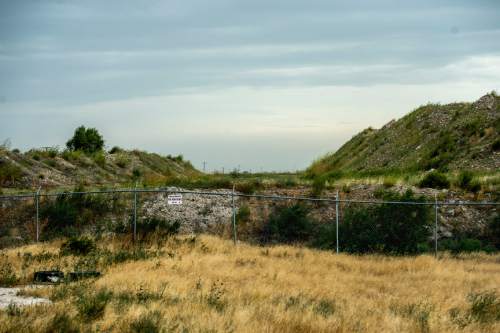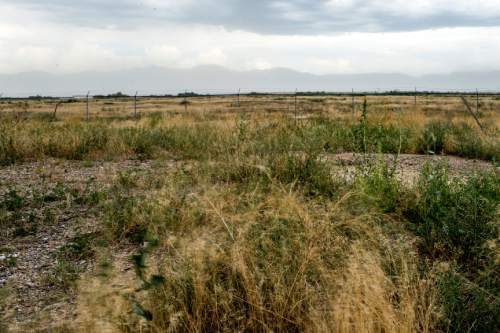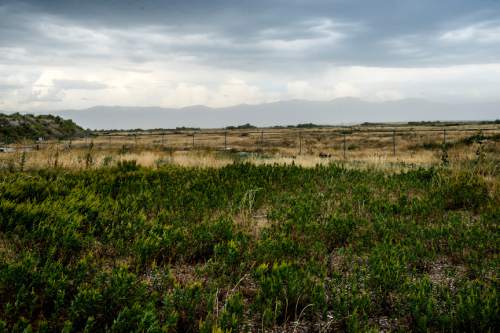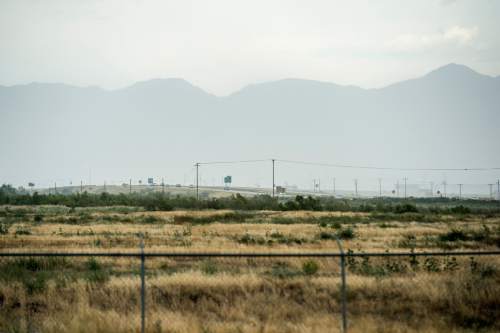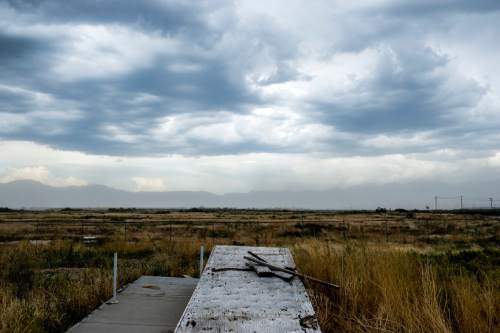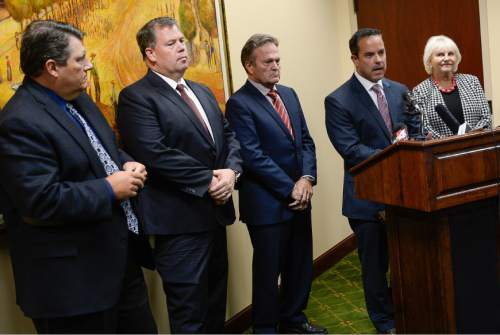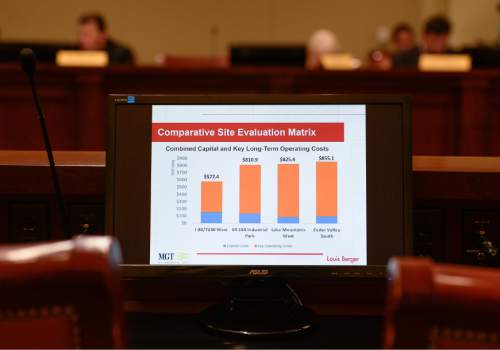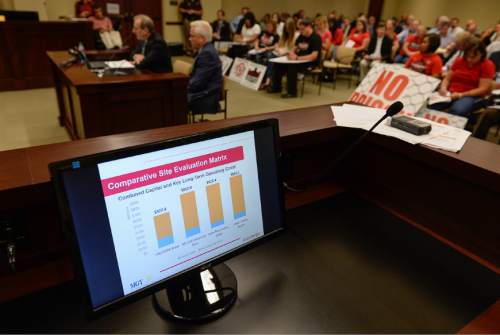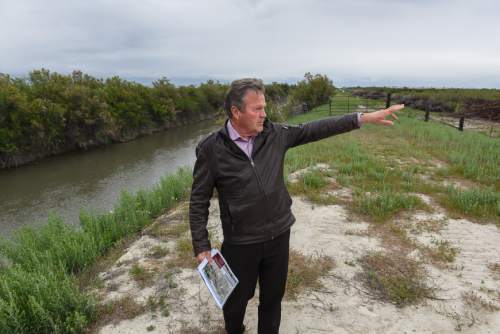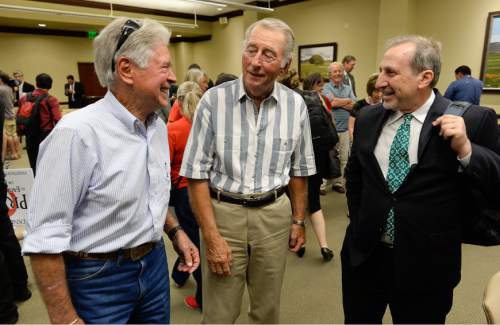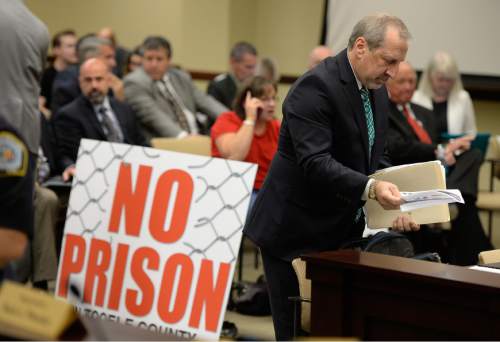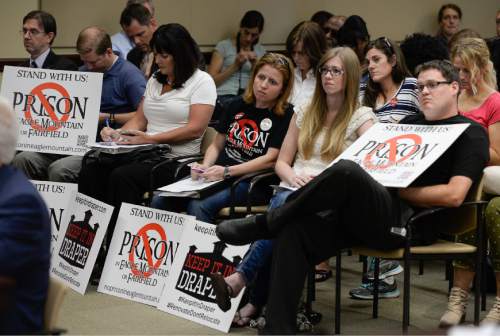This is an archived article that was published on sltrib.com in 2015, and information in the article may be outdated. It is provided only for personal research purposes and may not be reprinted.
Picking proximity over the cheapest price tag, the Prison Relocation Commission on Tuesday unanimously recommended building a new penitentiary west of the Salt Lake City International Airport.
The commission's seven voting members, all state lawmakers, were swayed by having a site easily accessible to volunteers and employees, and one that is close to courthouses and hospitals, so much so that they were willing to look past the site's flaws. The land is three miles west of the airport and close to the Great Salt Lake. It'll take at least $60 million and 18 months just to prepare the soft soil to build.
The extra cost is worth it, said Sen. Jerry Stevenson, R-Layton, a commission co-chairman who made the motion to pick Salt Lake City. He pointed to studies showing an urban prison would save more than $250 million during the next 50 years in transportation and water costs. And the prison should spur rapid development in the area. When it came time to make a decision, the commission didn't discuss any option other than Salt Lake City.
"We understand the issue, and we've made the best decision we can make," he said. "This makes the most sense."
The selection came as a relief to residents in Grantsville, Eagle Mountain and Fairfield, the other three locations under consideration. It was celebrated by groups such as the Salt Lake Chamber and the American Civil Liberties Union of Utah. But the choice was met with bitter opposition from Salt Lake City Mayor Ralph Becker and the City Council.
"They have forced a new prison on Salt Lake City against our wishes," Becker said in a hastily called news conference at the proposed prison site that was cut short by an approaching storm. "We will continue to do everything we can to keep this site from [officially] being accepted."
Becker and City Councilman James Rogers argued the prison would stunt growth in the area and remove more taxable land from a city that already hosts state buildings, the University of Utah and the headquarters of The Church of Jesus Christ of Latter-day Saints.
Rep. Sandra Hollins, a Democrat who represents the airport area and portions of west Salt Lake City, said she felt cut out of the process and ignored.
"This is a bad decision," she said, "that will only further sidetrack neighborhoods that are on their way to cultural and economic success."
According to a recent Salt Lake Tribune poll, at least two-thirds of the city's voters are against moving the prison to Utah's capital. Like Becker, most of them believe the prison should stay in Draper, where it has been since 1951. Legislators hope to eventually turn the 700-acre prison site off of Interstate 15 in Draper into a high-tech business park.
Rep. Brad Wilson, R-Kaysville, the commission's other co-chairman, and the panel's consultants originally believed they would find a city that wanted the prison for its steady jobs. They were wrong. Instead, the relocation debate spurred the creation of community groups that aggressively fought to keep a prison out of their area. While many of those activists were excited with Tuesday's decision, a core group said they would continue to fight to keep the prison from relocating.
"It is great for the three sites not chosen, but it is a bad decision for Utah taxpayers in general," said Stephanie Gricius, a northern Utah County resident, who promised to continue to fight.
The first option is to persuade the Legislature to reject the commission's recommendation. Gov. Gary Herbert said he would call a special legislative session, which could take place as soon as Aug. 19.
Wilson said he had "a high degree of confidence" that the Legislature will accept the recommendation. House Speaker Greg Hughes, R-Draper, said he's ready to support it, adding that the state is benefited by the public, contentious debate.
If the Legislature and governor sign off, as expected, the state would move quickly to buy the land and start site preparation. The relocation commission would be rebranded the Prison Development Commission and oversee the project, with the goal of opening a new 4,000-bed prison by 2020, at a price tag of at least $550 million.
But Salt Lake City leaders have suggested they may file an environmental lawsuit to try to at least slow that down. Wilson suggested such as suit would not only delay the prison, but also a state effort to offer more treatment to inmates who are addicted to drugs or suffer from mental illness.
"People can threaten all kinds of things," he said. "We have to do what we think is in the best interest."
Rogers, the city councilman, said that's not what happened Tuesday. He argued the decision is "a total political move," largely pushed by Republicans on a city full of Democrats.
Wilson called that claim "patently false and ridiculous," noting that two Democrats, Sen. Karen Mayne, D-West Valley City, and Rep. Mark Wheatley, D-Murray, voted to move the prison to Salt Lake City.
Mayne said partisanship had nothing to do with it. "We had to find the place that was best for the state."
She based her decision on the reduced transportation costs and the certainty that the only development around the new prison would be industrial and not residential.
The Salt Lake City site includes 4,000 acres owned by Rio Tinto, the company that operates the Kennecott copper mine, and the Pedroncelli family, which owns a winery in California's Sonoma Valley. The land is a few miles west of the airport and is covered with 7-foot tamarisk trees and brush. Cows and a few antelope graze on the land that is often infested with mosquitoes.
It would be up to the Utah Division of Facilities Construction and Management to pick the best 500 acres on that site, which is roughly near 7200 West and Interstate 80. Consultants estimated that it will cost at least $154 million just to buy the land and get it ready for construction. That's far more than the other three sites under consideration, with the lowest being $88 million for the Eagle Mountain site. The Salt Lake City price tag doesn't include remediation costs for a nearby landfill. That issue will take further study.
Consultants offered a detailed analysis of each site that included costs, environmental concerns and estimated economic impact. It also included a suggestion for how to use inmate labor to benefit the community: Have offenders help maintain the conversation zones around the Great Salt Lake.
Christopher Smart contributed to this article.


